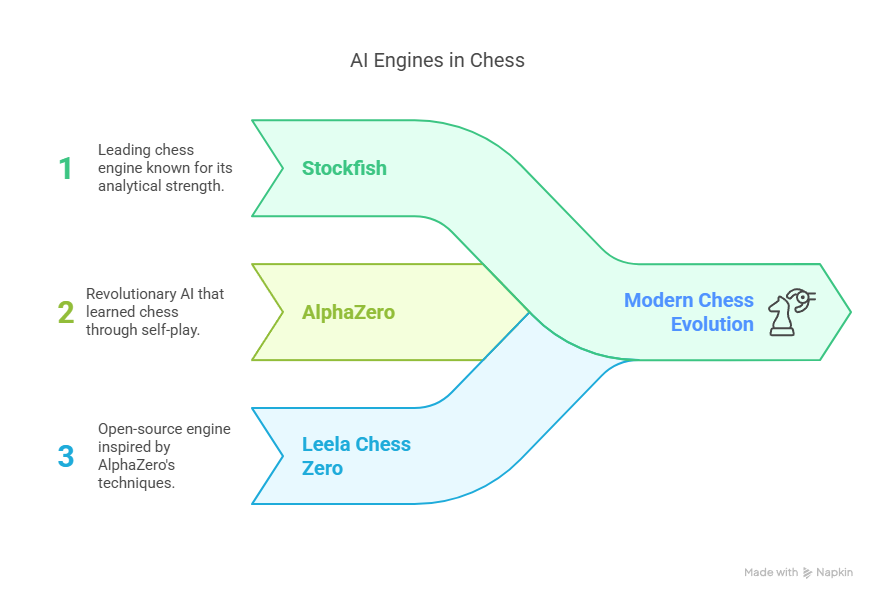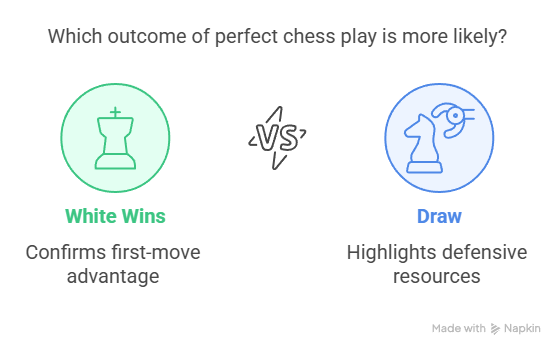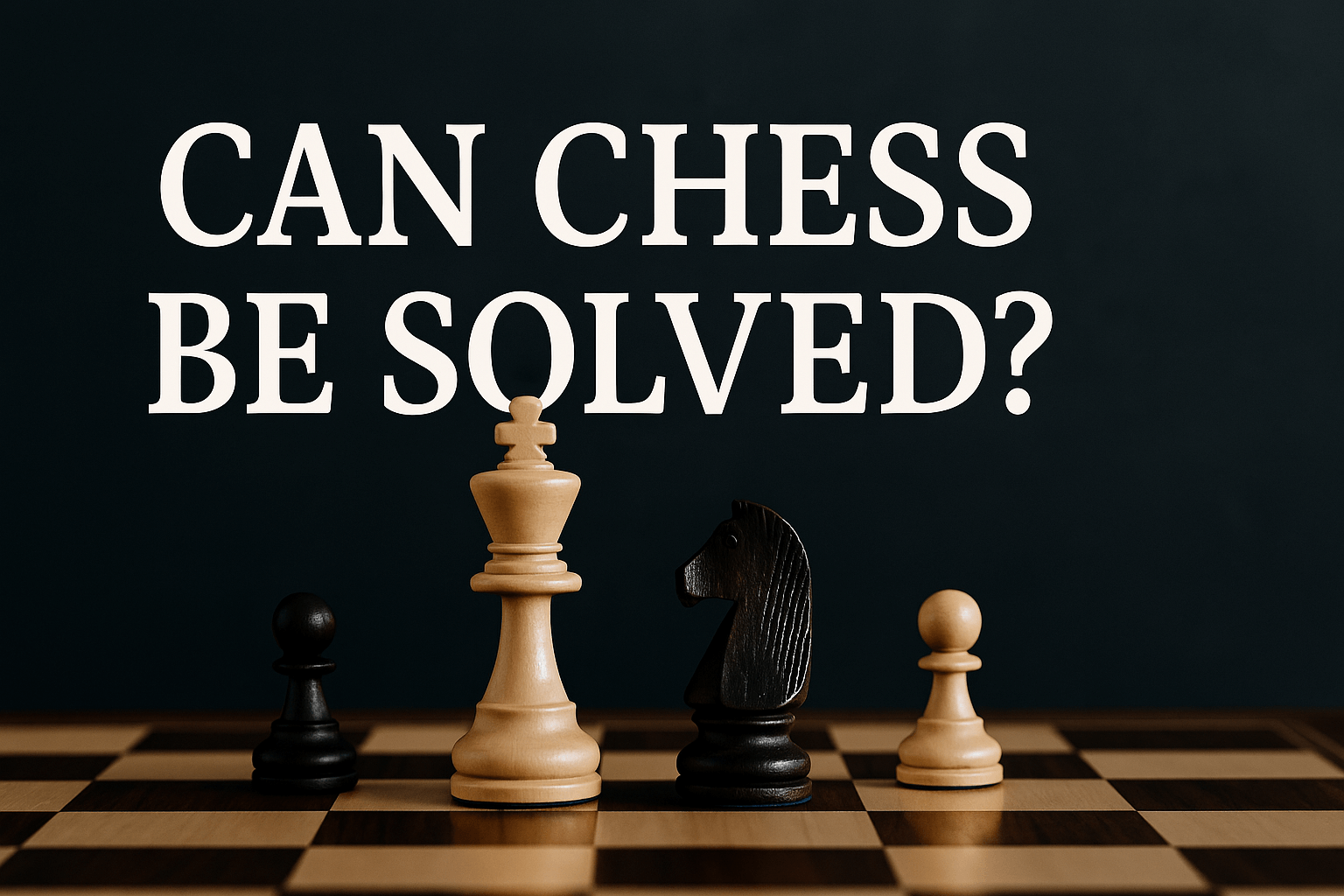Introduction
Chess has fascinated players for centuries as both a strategic game and a complex intellectual puzzle.. One question continues to spark fascination: Can chess be solved? That is, is it possible to determine with absolute certainty the outcome of a perfectly played game from start to finish?
This question crosses mathematics, computing, and philosophy, exploring limits of knowledge and decision-making beyond chess. Understanding whether chess is solvable challenges our concepts of complexity, determinism, and artificial intelligence.
In this blog, we’ll explore what it truly means for a game to be solved, how complex chess really is, and what progress has already been made toward solving it. We’ll look at the role of modern AI, whether perfect play is even theoretically achievable, and what it might mean for the game if that day ever comes.
What Does It Mean When We Ask, “Can Chess Be Solved?”
A game is solved when every position’s outcome is known, assuming perfect play by both players. This means that for any situation that arises, the ideal move is predetermined, leading to a guaranteed win, loss, or draw – depending on the position and who moves next.
Some simpler games have already been solved. Tic-Tac-Toe, for instance, is a game where optimal play by both players will always result in a draw. Connect Four has also been solved: if both players play perfectly, the first player (who goes first) can force a win.
Solving a game doesn’t just mean knowing how to win – it means removing uncertainty entirely. The game becomes a sequence of forced outcomes, and every move is part of a pre-calculated roadmap. While this may reduce suspense, it offers profound insights into the structure of the game itself. So, what would it take to apply this level of understanding to chess?
What Has Been Solved So Far?
While the full game of chess remains unsolved, significant progress has been made in limited scenarios – especially in endgames and simplified variants of the game.
The most notable achievement is the development of endgame tablebases. These are exhaustive databases that contain the perfect outcome for any position with seven or fewer pieces on the board (including both kings). Created using brute-force computation, tablebases like Nalimov, Syzygy, and others map out every legal move and its consequence, offering guaranteed wins, losses, or draws for each side with flawless play. For these positions, the game is essentially solved. Thanks to endgame tablebases, some positions with a small number of pieces are fully solved, providing perfect play for both sides. To improve your endgame skills, explore my post on How to Study Chess Endgames.
Chess has also been fully solved on smaller boards, such as 3×3 or 4×4 versions. These simplified variants strip away the complexity and scale of standard chess, making it computationally feasible to calculate all possibilities. However, they’re more curiosities than practical breakthroughs for the full 8×8 game.
Despite these advancements, they come with significant limitations. Endgame tablebases apply only when the game has been reduced to a handful of pieces – far removed from the intricacies of opening and middlegame strategies. And while smaller-board solutions offer theoretical insight, they don’t scale well to standard chess. The full game’s complexity explodes exponentially, quickly overwhelming even the most advanced systems.
The Role of Computers and AI
Modern chess has been profoundly shaped by powerful engines like Stockfish, AlphaZero, and Leela Chess Zero. These programs play at superhuman levels and have redefined our understanding of chess strategy. But are they solving the game?
Not quite.
- Stockfish, the traditional engine, uses brute-force search combined with sophisticated evaluation functions and pruning algorithms. It can calculate millions of positions per second, evaluating outcomes based on material, position, king safety, and more.
- AlphaZero, developed by DeepMind, took a different approach. It used reinforcement learning to train itself by playing millions of games against itself, without any human input. In just hours, it developed a fresh, aggressive style that stunned the chess world.
- Leela Chess Zero followed a similar method, as an open-source neural-network-based engine inspired by AlphaZero. It continues to learn and improve with community training.
While these engines often find the best move in practice, they do not “solve” chess in the strict sense. Instead of mapping out every possibility, they rely on heuristics, pattern recognition, and probabilistic evaluations to make decisions. They give us strong approximations of perfect play, but they don’t provide the certainty that a solved game requires.
Their impact, however, is undeniable. These AI systems have revolutionized how humans train, analyze, and understand the game. They’ve brought us closer to the ideal – but full solvability still lies far beyond their reach.

Is Chess Theoretically Solvable?
At its core, chess is a finite, deterministic game. There are no elements of chance, and the game always ends – either by checkmate, stalemate, draw by repetition, the 50-move rule, or insufficient material. Chess is solvable in theory because perfect analysis can reveal every legal position’s outcome.
This leads to a tantalizing question: If both players play perfectly from move one, what should the result be? There are two widely considered possibilities:
- White wins because of the inherent first-move advantage
- The game is a forced draw with optimal play from both sides
We just don’t know – because solving chess would require analyzing every possible sequence of legal moves from the initial position. The number of possible positions is estimated to be around 10⁴⁵ to 10⁴⁷, and the number of possible games is far greater still. Even the fastest computers today couldn’t exhaustively evaluate such an enormous game tree.
However, the field of computing is always evolving. Quantum computing, which leverages quantum bits (qubits) to process massive parallel computations, offers a glimmer of hope for tackling problems of this magnitude in the future. While it’s still in its early stages, quantum advancements could, one day, bring us closer to solving chess – not just practically, but completely.
What Would Happen If Chess Were Solved?
If chess were fully solved, we would know the outcome of every legal position on the board. The opening move 1.e4, for example, could be definitively declared a win, draw, or loss – assuming perfect play from both sides.
Let’s imagine the most likely theoretical outcomes:
- White always wins with perfect play: This would confirm that the first-move advantage is decisive.
- Perfect play always leads to a draw: This would mean that, despite White’s initiative, Black has enough defensive resources to hold.
But would solving chess ruin the game?
Unlikely.
In the real world, chess would still be rich and rewarding. The depth of the game lies in the human experience – in creativity, psychology, risk-taking, and error. Even if we knew that perfect play leads to a draw, very few players (even at the highest levels) would be able to replicate it consistently.
The gap between theoretical knowledge and practical execution is enormous. Much like how tic-tac-toe remains playable despite being solved, chess would likely remain deeply engaging. Human players would still struggle with calculations, evaluations, and strategy – meaning that solving chess would change its theoretical landscape, but not its soul.

Can Chess Be Solved: Final Thoughts
The question of whether chess can be solved is not just a matter of computational power, but also a philosophical exploration of perfection, complexity, and the human experience of the game. While chess remains unsolved today, significant progress has been made in solving specific endgames and analyzing smaller board variants. The rise of AI engines like Stockfish and AlphaZero has brought us closer to understanding optimal play, but we are still far from exhaustively solving the game in its entirety.
Theoretically, chess is solvable due to its deterministic nature, but the computational challenge remains immense. If chess were solved, the outcome would either be a guaranteed win for White or a forced draw – but this would not diminish the game’s allure. The gap between perfect theoretical play and human ability ensures that chess will continue to be a rich, dynamic pursuit for players of all levels.
Ultimately, solving chess may be a future milestone in the evolution of game theory and artificial intelligence, but for now, the game remains as captivating as ever, offering endless opportunities for creativity, strategy, and improvement. Whether it is solved in our lifetime or not, the mystery of chess will continue to inspire and challenge us for generations to come.
FAQ
- Can chess ever truly be solved?
While chess is theoretically solvable, the computational power required to analyze every possible move and outcome makes it impractical with current technology. Advances in AI and quantum computing may bring us closer to a solution in the future. - What does it mean for a game to be “solved”?
A game is considered “solved” when all possible moves and outcomes are known, allowing players to determine the best possible strategy for every situation. In solved games, the outcome can be predicted perfectly, assuming both players play optimally. - Has chess already been solved in some areas?
Yes, certain aspects of chess have been solved. Endgames with up to seven pieces have been solved using databases like Nalimov and Syzygy, and smaller boards, like 3×3 chess variants, have also been solved. - Can AI solve chess?
AI engines like Stockfish and AlphaZero can play at a superhuman level and have dramatically improved our understanding of chess strategy. However, these engines do not “solve” chess – they evaluate positions based on heuristics and deep learning rather than exhaustively analyzing every possible outcome. - How would solving chess impact the game?
If chess were solved, the result would likely be a forced draw or a guaranteed win for White, depending on perfect play. However, the competitive and recreational appeal of chess would remain, as most human players will never reach perfect play. The thrill of chess lies in its complexity and the challenge of improving, not just the final outcome.

